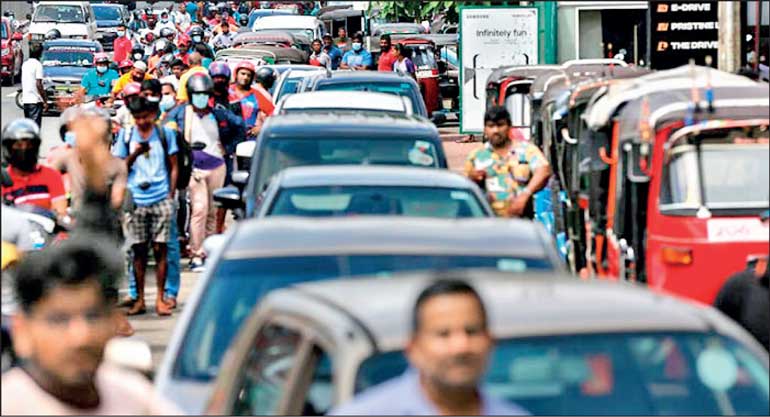Friday Feb 13, 2026
Friday Feb 13, 2026
Saturday, 18 March 2023 00:10 - - {{hitsCtrl.values.hits}}

Unless the system is changed no amount of IMF injection of funds and flow of advice is going
to benefit the people
 It is now almost certain that the $ 2.9 billion from IMF’s Extended Fund Facility (EFF) would be unlocked soon, and following its release more funds are expected to flow into Sri Lankan coffers, from the World Bank, Asian Development Bank, and other agencies. However, negotiations over debt restructuring especially with private creditors is another matter, which would create more complications and prolong for years.
It is now almost certain that the $ 2.9 billion from IMF’s Extended Fund Facility (EFF) would be unlocked soon, and following its release more funds are expected to flow into Sri Lankan coffers, from the World Bank, Asian Development Bank, and other agencies. However, negotiations over debt restructuring especially with private creditors is another matter, which would create more complications and prolong for years.
For example, Zambia which received IMF support to overcome Restricted Default in August 2022, still negotiates over debt restructuring. Although China had issued a letter of assurance to facilitate IMF EFF release, no one knows what is in its sleeves when restructuring negotiations start in a couple of months. Be that as it may, President Ranil Wickremesinghe (RW) could have a sigh of relief that his persistence over approaching IMF has finally borne fruits, though they are not that sweet.
Unlike in the previous 16 occasions when Sri Lanka sought assistance from IMF, the 17th has far more serious implications. With this dose of assistance and attached conditionalities IMF directly and the US indirectly have achieved invisible control over the country’s money supply. Amschel Rothschild (1744-1812) from the famous European Banking dynasties is reported to have said, “Let me issue and control a nation’s money and I care not who makes the laws”. Although the Central Bank of Sri Lanka Bill introduced recently and expected to be passed by the parliament aims to reassure the independence of SLBC, which virtually surrendered its constitutionally guaranteed independence over the years and more blatantly under Gotabaya Presidency, that institution, in spite of its Governor’s resolve to take decisions that may not be palatable to governments in power, the situation today is such that the Presidency, Government and SLBC are all under the tutelage of IMF.
Dr. Weerasinghe openly said, “We have done all prior actions required and we stand ready for the IMF program” (DFT, 7 Mar 2023). Note the word program. What program does CBSL need other than to regulate its monetary policy? Thus, IMF, and via that tool US, has virtually become the controller of Sri Lanka’s money supply. RW and his parliament have no choice but to go along with it. He who pays the Piper calls the tune.
What does this program mean to ordinary citizens? The first taste of it was outlined in RW’s 2023 budget. Higher taxes, restricted imports, high interest rates, and market determined foreign exchange rates are the budget’s pathways to achieve prosperity under IMF tutelage. The immediate end-product of all this is rising domestic prices, increasing cost of living and worsening poverty, which according to the President are unavoidable in the interest of long-term prosperity. That long term seems to be 25 years according to him. In the meantime, pay the taxes and tighten your belts is his advice to the citizens.
As if to prove that RW was right, over the last couple of weeks the rupee had appreciated against the dollar, which was enough for his ministers to trumpet that falling import prices and therefore fall in cost of living are around the corner. Consequently, the herd instinct prompted many dollar holders to convert their dollars to rupees to avoid further losses. These dollar hoarders should know that a few drops of rain from passing cloud are insufficient to wet the ground. The current appreciation is temporary and when import restrictions are relaxed the demand for dollars would increase and rupee would depreciate again if the value of exports fail to match that of imports.
One of the problems with the milk expected to flow from IMF and other sources is that it is going to be watched by the same clowder of cats that drank the previous stock and emptied the container. This is why people are suspicious of IMF help and demanding an opportunity to chase out those cats, at least to protect the new stock. Although the President, his Government and SLBC are under IMF tutelage, and even opposition parties for that matter, except NPP, seem to have accepted that tutelage, people are not. In that sense, IMF has drawn the battle line between those who see its assistance virtuous and those who view it as villainous. The reason why RW is not prepared to give a chance for people to have a say on this matter through ballot, at least at the level of Local Government Elections, is because of his team’s fear of losing to the naysayers. But their number is found to be on the rise according to opinion polls.
There is no alternative however, to the IMF solution as long as the economy remains locked into the ruling neoliberal global economic order. That order is now facing worldwide discontent. In Sri Lanka however, economic discontent is only one part of a “polycrisis”. The system under which its economy operates is fundamentally flawed allowing ample room for rampant corruption and unchecked loot. Unless the system is changed no amount of IMF injection of funds and flow of advice is going to benefit the people. Therefore, the battle line drawn by IMF is also a line between system changers and system preservers.
The ruling regime and all opposition parties except NPP are willing to preserve the existing system with little adjustments. In contrast, NPP and the Aragalaya youth, want that system changed and they seem to be gaining ground among the voting public. This is why there is panic in the other camp which prompted one opposition stalwart to call for merger between the leading opposition party and the regime to defeat NPP at the next election. The system preservers are singling out the JVP, a component of NPP, and campaigning to scare the people by reminding them of JVP’s murderous past. JVP has become their whipping boy.
But those who know the history of JVP would be aware that the current avatar of that party is built by a new generation of men and women who had nothing to do with that past and are pragmatic enough to seek power through ballot and qualified enough to maintain that power through delivering its promises to voters with honesty and integrity. The task of NPP is to counter the scare mongering by the opponents by convincing voters of NPP’s socio-economic and political alternative. The country needs a new system backed by a new constitution and that system calls for a team of managers who would be accountable to the people.
In short, IMF intervention without changing the system at best could be a palliative to the country’s economic crisis. It is certainly not a panacea for the “polycrisis”.
(The writer is attached to Murdoch Business School, Murdoch University, Western Australia.)